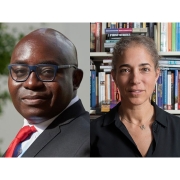Sarah Tishkoff Links Ability to Digest Milk to Development of Pastoralism

Babies are born with the ability to digest lactose, the sugar found in milk, but most humans lose this ability after infancy because of declining levels of the lactose-digesting enzyme lactase. People who do maintain high levels of lactase reap the nutritive benefits of milk, offering a potential evolutionary advantage to lactase persistence, or what is commonly known as lactose tolerance.
A new study led by University of Pennsylvania researchers—constituting the largest examination ever of lactase persistence in geographically diverse populations of Africans—investigated the genetic origins of this trait and offers support to the idea that the ability to digest milk was a powerful selective force in a variety of African populations which raised cattle and consumed the animals’ fresh milk.
The research was led by David and Lyn Silfen University Professor Sarah Tishkoff, who holds appointments in the Department of Biology and Penn Medicine’s Department of Genetics, and Alessia Ranciaro, a postdoctoral fellow in the Department of Genetics
Their analysis revealed strong evidence of recent positive selection affecting several variants associated with lactase persistence in African populations, likely in response to the cultural development of pastoralism. The distinct geographic patterns in which these variants were present correlate in many cases with historic human migrations, mixing between populations as well as the spread of cattle, camels, or sheep.
Additional co-authors on the study included Michael C. Campbell, Jibril B. Hirbo and Wen-Ya Ko of Penn’s Department of Genetics; Alain Froment of the Musée de l’Homme in Paris; Paolo Anagnostou of Universita’ La Sapienza and Istituto Italiano di Antropologia in Rome; Maritha J. Kotze of the University of Stellenbosch in South Africa; Muntaser Ibrahim of the University of Khartoum; Thomas Nyambo of Muhimbili University of Health and Allied Sciences in Tanzania; and Sabah A. Omar of the Kenya Medical Research Institute.
The paper was published in the American Journal of Human Genetics. Their research was supported by the National Science Foundation and the National Institutes of Health.
Read the full story here.





